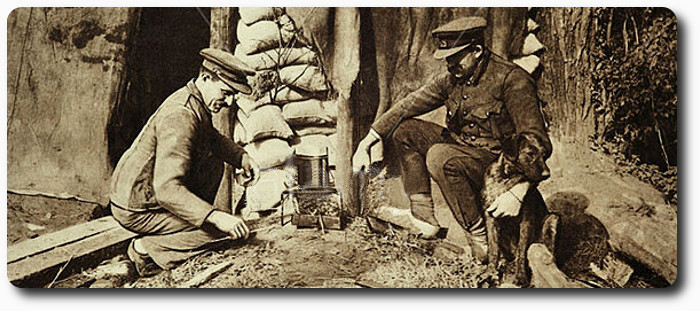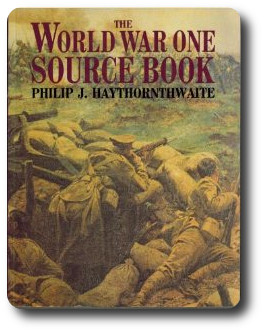Topic: Army Rations

British and German Rations; 1914 & 1916
The World War One Sourcebook, Philip J. Haythornthwaite, Arms and Armour Press, 1992
 British Daily Ration, 1914:
British Daily Ration, 1914:
1 ¼ lb fresh or frozen meat, or 1 lb preserved or salt meat; 1 ¼ lb bread, or 1 lb biscuit or flour; 4 oz. bacon; 3 oz. cheese; 5/8 oz. tea; 4 oz. jam; 3 oz. sugar; ½ oz salt; 1/36 oz. pepper; 1/20 oz. mustard; 8 oz. fresh or 2 oz. dried vegetables; 1/10 gill lime juice if fresh vegetables not issued;* ½ gill rum;* not exceeding 2 oz. tobacco per week. (* at discretion of commanding general.)
The following substitutions were permitted if necessary: 4 oz. oatmeal or rice instead of 4 oz. bread or biscuit; 1/30 oz. choclate instead of 1/6 oz. tea; 1 pint porter instead of 1 ration spirit; 4 oz. dried fruit instead of 4 oz. jam; 4 oz. butter, lard or margarine, or ½ gill oil, instead of 4 oz. bacon.
British Daily Ration, India:
1 lb fresh meat; 1 lb bread; 3 oz. bacon; 1 lb potatoes; 1 oz. tea; 2 ½ oz. sugar; ½ oz salt; 1/36 oz. pepper.
British daily ration, Indian troops:
¼ lb fresh meat; 1/8 lb potatoes; 1/3 oz. tea; ½ oz salt; 1 ½ lb atta; 4 oz. dhall; 2 oz. ghee; 1/6 oz. chillies; 1/6 oz turmeric; 1/3 oz. ginger; 1/6 oz. garlic; 1 oz. gur.
British Iron Ration, carried in the field:
1 lb. preserved meat; 12 oz. biscuit; 5/8 oz. tea; 2 oz. sugar; ½ oz. salt; 3 oz. cheese; 1 oz. meat extract (2 cubes.)

German Daily Ration, 1914
(measured in grams; ounce equivalent in parentheses)
750g (26 ½ oz) bread, or 500g (17 ½ oz) field biscuit, or 400g (14 oz.) egg biscuit; 375g (13 oz.) fresh or frozen meat, or 200g (7 oz) preserved meat; 1,500g (53 oz.) potatoes, or 125-250g (4 ½-9 oz.) vegetables, or 60g (2 oz.) dried vegetables, or 600g (21 oz.) mixed potatoes and dried vegetables; 25g (9/10 oz.) coffee, or 3g (1/10 oz.) tea; 20g (7/10 oz.) sugar; 25g (9/10 oz.) salt; two cigars and two cigarettes or 1 oz. pipe tobacco, or 9/10 oz. plug tobacco, or 1/5 oz. snuff; at discretion of commanding officer: 0.17 pint spirits, 0.44 pint wine, 0.88 pint beer. The meat ration was reduced progressively during the war, and one meatless day per week was introduced from June 1916; by the end of that year it was 250g (8 3/4 oz.) fresh meat or 150g (5 ¼ oz.) preserved, or 200g (7 oz) fresh meat for support and training personnel. At the same time the sugar ration was only 17g (6/10 oz.)
German Iron Ration:
250g (8.8 oz) biscuit; 200g (7 oz.) preserved meat or 170g (6 oz.) bacon; 150g (5.3 oz.) preserved vegetables; 25g (9/10 oz.) coffee; 25g (9/10 oz.) salt.

